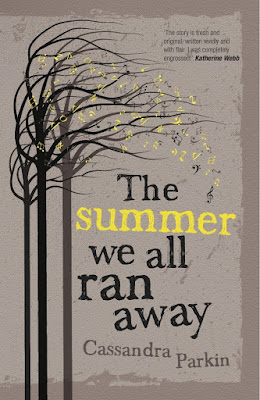The Summer We All Ran Away - Cassandra Parkin
I was attracted to Cassandra Parkin’s debut novel by its beautiful and unusual cover and its intriguing blurb, which promises a story of mystery and music. The Summer We All Ran Away alternates between two tales: the life of a group of outcasts squatting in an old house in Cornwall in the present day and the antics of rock star Jack Laker in that same house in the 1970s.
The novel really wasn’t what I expected it to be, which isn’t necessarily a bad thing. Some elements pleasantly surprised me; for example, in the present day narrative, Tom’s back-story is fascinating and the family-like connection between himself, Kate, Priss and Davey is sweet and genuine. I also really appreciated the fact that the story lacked sentimentality and sap, whilst retaining real emotion.
The blurb suggests that all five squatters are directly linked to Jack and his actions over the ‘70s summer, whereas, in reality, only two of them are directly connected. I did, however, enjoy all of their stories. After one drugged-up party, the ‘70s scene fizzles out, which was sad because I felt that it could have been utilised more strongly. The elements of Jack’s music were also not as integral to the plot as I would have hoped and neither was the physical setting of Cornwall; the house and garden are well described but I would have liked to see more of the surrounding area.
The big murder mystery at the centre of it all is actually much less important than the reader is led to believe it is going to be. Really the book is about unhappy people trying to make good and the mystery is tied up in that rather than being the main thrust of the book. When the truth comes out it’s in a quiet way rather than a big reveal. It’s very clever on the author’s part that you spend the whole book wondering who will die and how – yet the real mystery lies in who is still alive.
Despite the issues I’ve mentioned, I adored the vibe of The Summer We All Ran Away; it doesn’t feel like another summer coming-of-age novel, maybe because the summer ends far from happily and nobody comes out of it well. It is dark and sad with a sense of impending doom, yet it has moments of stunning beauty.
*This review was originally written for Cuckoo Review (New Writing North) and is reprinted with permission*
The novel really wasn’t what I expected it to be, which isn’t necessarily a bad thing. Some elements pleasantly surprised me; for example, in the present day narrative, Tom’s back-story is fascinating and the family-like connection between himself, Kate, Priss and Davey is sweet and genuine. I also really appreciated the fact that the story lacked sentimentality and sap, whilst retaining real emotion.
The blurb suggests that all five squatters are directly linked to Jack and his actions over the ‘70s summer, whereas, in reality, only two of them are directly connected. I did, however, enjoy all of their stories. After one drugged-up party, the ‘70s scene fizzles out, which was sad because I felt that it could have been utilised more strongly. The elements of Jack’s music were also not as integral to the plot as I would have hoped and neither was the physical setting of Cornwall; the house and garden are well described but I would have liked to see more of the surrounding area.
The big murder mystery at the centre of it all is actually much less important than the reader is led to believe it is going to be. Really the book is about unhappy people trying to make good and the mystery is tied up in that rather than being the main thrust of the book. When the truth comes out it’s in a quiet way rather than a big reveal. It’s very clever on the author’s part that you spend the whole book wondering who will die and how – yet the real mystery lies in who is still alive.
Despite the issues I’ve mentioned, I adored the vibe of The Summer We All Ran Away; it doesn’t feel like another summer coming-of-age novel, maybe because the summer ends far from happily and nobody comes out of it well. It is dark and sad with a sense of impending doom, yet it has moments of stunning beauty.
*This review was originally written for Cuckoo Review (New Writing North) and is reprinted with permission*




Comments
Post a Comment